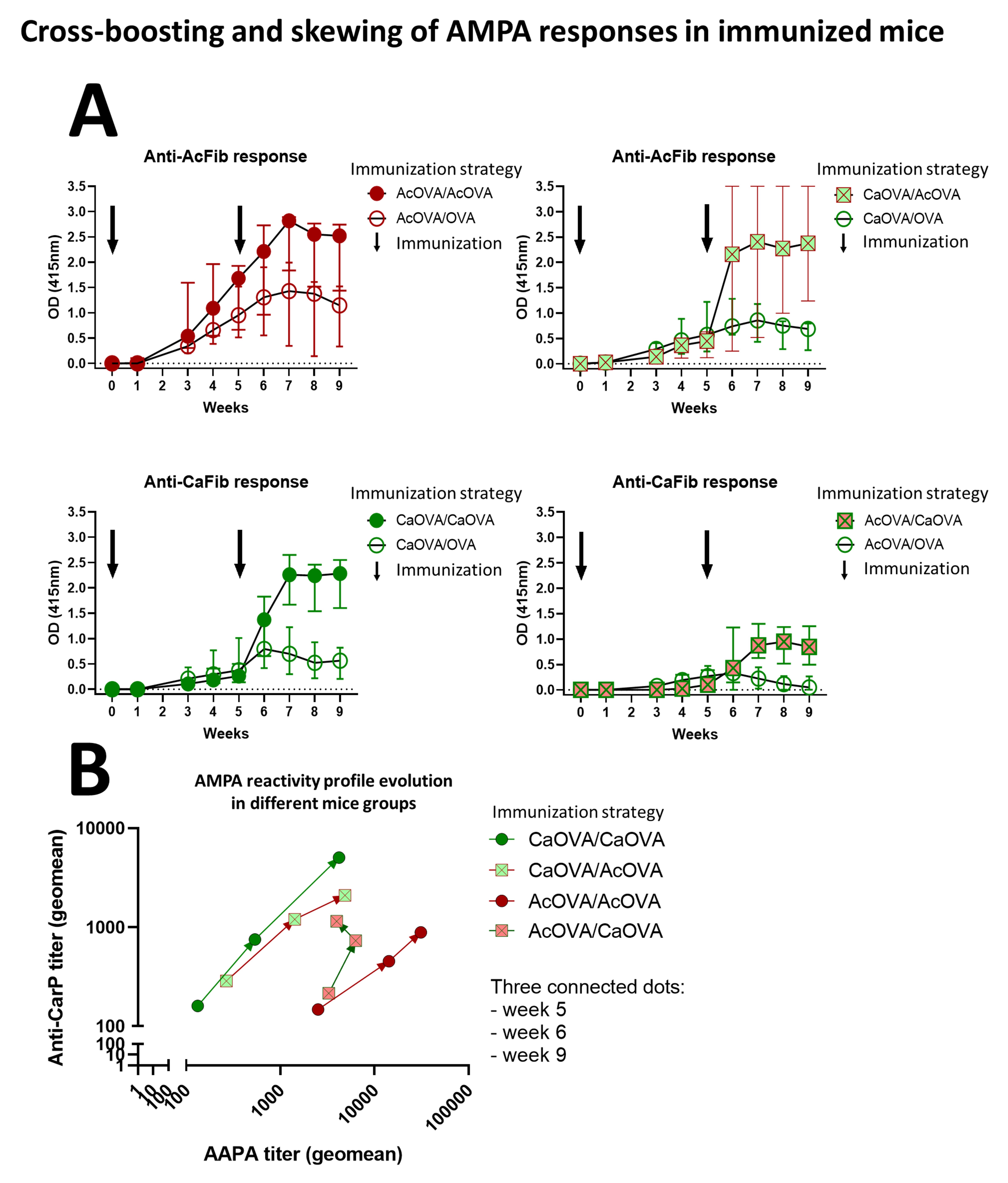Session Information
Session Type: Poster Session A
Session Time: 8:30AM-10:30AM
Background/Purpose: Besides anti-citrullinated protein antibodies (ACPA), rheumatoid arthritis patients (RA) often display autoantibody reactivities against other post-translationally modified (PTM) proteins, more specifically carbamylated and acetylated proteins. Immunizing mice with one particular PTM results in an anti-modified protein antibody (AMPA) response recognizing multiple PTMs. Furthermore, human AMPA, isolated based on their reactivity to one PTM, cross-react with other PTMs at the monoclonal and polyclonal level. However, it is unclear whether the AMPA reactivity profile is “fixed” in time, or whether consecutive exposure to different PTMs can shape the evolving AMPA-response. In this work, we aimed to investigate the evolution of the AMPA response in mice with controlled exposure to PTMs as well as in humans at risk of RA and with early RA.
Methods: Mice were immunized with acetylated (or carbamylated) protein (ovalbumin) twice or cross-immunized with an acetylated and then a carbamylated protein (or vice versa) and their serum was analyzed for AMPA responses using a different backbone protein (fibrinogen) bearing the same modifications. Longitudinally collected serum samples of human individuals at risk of RA and with early RA were tested to investigate the evolution of the AMPA responses over time.
Results: Mice immunized twice with either solely acetylated or solely carbamylated ovalbumin (AcOVA or CaOVA) developed reactivity against both acetylated and carbamylated antigens. Irrespective of the PTM used for the first immunization, a booster immunization with the other PTM resulted in increased titers to the second/booster PTM (Figure A), indicating that immunization with a defined PTM-antigen leads to the generation of anti-PTM memory B cells able to cross-recognize other PTMs. Furthermore, immunizing with CaOVA and boosting with AcOVA (or vice versa) skewed the overall AMPA-response profile towards a relatively higher reactivity against the “booster” PTM (Figure B). Human data also illustrated dynamic changes in AMPA reactivity profiles in both individuals at risk of RA and in early RA patients (not shown).
Conclusion: The relationship between different reactivities within the AMPA response is dynamic. The initial exposure to a PTM antigen induces cross-reactive response that can be boosted by this or other PTMs. The overall reactivity pattern can be shaped by subsequent exposure to other PTMs. These data might explain temporal differences in the AMPA-response profile and point to the possibility that the PTM responsible for the initiation of the AMPA response may differ from the PTM predominantly recognized later in time.
To cite this abstract in AMA style:
Volkov M, Kampstra A, van Schie K, Huizinga T, Toes R, van der Woude D. Evolution of Anti-modified Protein Antibody Responses Can Be Driven by Consecutive Exposure to Different Post-translational Modifications [abstract]. Arthritis Rheumatol. 2021; 73 (suppl 9). https://acrabstracts.org/abstract/evolution-of-anti-modified-protein-antibody-responses-can-be-driven-by-consecutive-exposure-to-different-post-translational-modifications/. Accessed .« Back to ACR Convergence 2021
ACR Meeting Abstracts - https://acrabstracts.org/abstract/evolution-of-anti-modified-protein-antibody-responses-can-be-driven-by-consecutive-exposure-to-different-post-translational-modifications/

